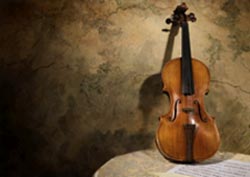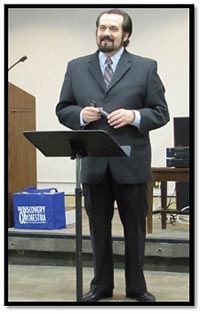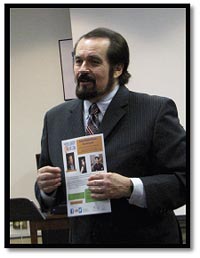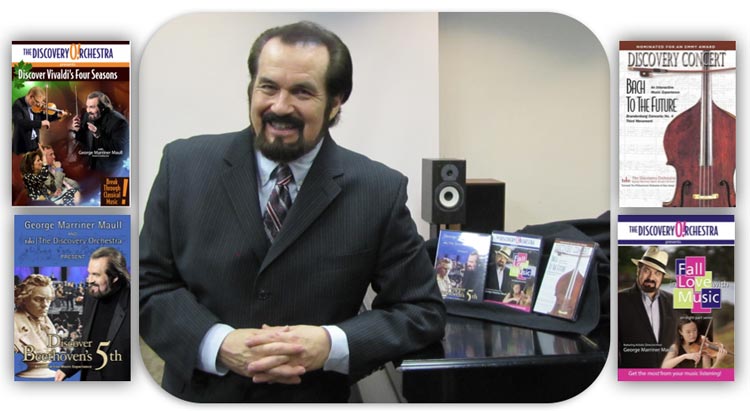Music Educators Association of New Jersey
Serving teachers and students since 1927



George Marriner Maull, in his MEA lecture on January 19 titled "Choir Boy to Conductor to Educator," began by stating "for 95% of our population, classical music is off the radar screen. Only 3% of Americans listen regularly to classical music."
Mr. Maull proceeded to tell about his own life and the influences of other musicians on him. The son of an accomplished pianist and teacher, he was "forced" to listen to his mother practice. He said "Physicists, researchers and doctors" now agree that six months into a pregnancy a baby listens to sounds outside his mother. George listened to his mother's piano students, to her accompanying singers, and to string quartets performing at his home. He remembers a pivotal moment when he was 4 1/2 and listened to an LP on a portable record player of Dvorak's New World Symphony and at times cried at the beauty of the music. George was sent at 8 1/2 to St. Peter's Choir School in Philadelphia. Harold Gilbert, Headmaster and Choirmaster, had been a student of Constantin von Sternberg, a student of Liszt. Mr. Maull studied Latin, French, solfège, piano and rehearsed after school each day with the choir. The men and boys choir sang two services of Anglican music every Sunday including chant psalms, and, upon request, sang at the Philadelphia Academy of Music for the Philadelphia Orchestra. Once, while singing Rachmaninov's "Beatitudes," and feeling "suspension and resolution," George looked around the church and noticed that not everyone was listening. Some of the congregation were focused on the music, others were not. A patron of the Philadelphia Orchestra gave tickets to the choir boys to attend Friday alernoon concerts conducted by Eugene Ormandy.

When Mr. Maull's voice changed, he attended Abraham Lincoln High School in Philadelphia, where he met Saul Feinberg, a General Music Class teacher who had developed a "Perceptive Music Listening" course. The goal of this course was to get 70% of his students each year to enjoy listening to classical music. George audited Mr. Feinberg's classes, experiencing Stravinsky's Firebird "sequence, tension and release" and becoming what he described as a "music vampire." Upon hearing Corelli's Concerti Grossi in 11th grade, Mr. Maull borrowed a high school viola and began to study with Irving Segall at the Philadelphia Settlement School. He practiced the viola tirelessly in his last two high school years, joining many amateur orchestras and received a full scholarship to the University of Louisville, Kentucky. In his junior year of college, Mr. Maull was invited into the viola section of the Louisville Orchestra. Aaron Copland and Igor Stravinsky both came as guest conductors during his tenure. Mr. Maull's conducting studies with Jorge Mester led to his becoming assistant conductor of the University orchestra and chorus, and conductor of the Louisville Ballet and another choral group. He also taught in a private school where he tried Saul Feinberg's methods.

When Mr. Maull moved to New York City in 1975, he played viola in the American Symphony Orchestra and the Brooklyn Philharmonic. He first sang Beethoven's 9th Symphony under Georg Solti in the New York Philharmonic Chorus. After becoming assistant conductor and chorus master for the Opera Orchestra of New York, he was given a fellowship to study with Austrian conductor Richard Johannes Lert who was the godson of Johannes Brahms. He learned many unusual performance traditions from Richard Lert who, for instance, had been told via a chain of information that Tchaikovsky himself wished to cut out certain bars from his 5th Symphony.
Mr. Maull became assistant conductor of the New Jersey Symphony subscription series and led the NJ Symphony's Young Peoples' Concerts into forty schools, and conducted the Plainfield Symphony, the NJ Youth Symphony, and a community orchestra on Long Island. In 1987 Mr. Maull started his own orchestra of professional musicians, the Philharmonic Orchestra of NJ, which played its first concert featuring Strauss waltzes at a fund-raising Viennese Ball in NJ. This was the first of 18 Viennese Balls later held at the Waldorf Astoria in NYC. In 1988 they began performing at the Pingry School in Martinsville, and thanks to good reviews, moved to Raritan Community College, Princeton University, then to the NJ Performing Arts Center in Newark. Mr. Maull was asked to provide a course in "How to Listen to Music" - a 90 minute course on six Monday nights. In 1996 the first Discovery Concert was presented in Princeton and later videotaped for television at NJPAC in 2002. "Bach to the Future" was produced with the goal of helping a nationwide audience learn "how to listen." In 2006 the Philharmonic Orchestra changed its name to The Discovery Orchestra.


Mr. Maull says, "We have been trained to ignore background music in supermarkets and elevators." It has become "sonic wallpaper." If you bring such music to someone's attention, they will respond, "Oh! I wasn't really listening." Listening means to give undivided attention to music. You can't change your mental focus. Listen for what? "Rhythm, Melody, Texture, Harmony, Dynamics, Timbre, Form." He has created four TV shows and videos, chats on the internet, live concerts. He urges us to get overwhelmed by "goosebumps." Everyone can become a "virtuoso listener." In one of his four television shows, "Discover Beethoven's 5th," the orchestra plays the movement straight through; then he begins to break it apart. Mr. Maull says, "Engage the audience in a humorous way: when the recap comes, 'stand up'; at resolution, 'sit down.' Make analogies to regular life." George mentioned Charlie Rose's interview with Alan Gilbert upon his leaving the NY Philharmonic at the end of this season, in which Mr. Rose asked Alan Gilbert whether it was important for there to be more things like Leonard Bernstein's televised Young People's Concerts, all of which are now available on DVD. Mr. Maull's answer is "Yes. Absolutely!"

Maestro Maull announced the next Discovery Concert "Return of Dueling Pianists," at Drew University's Concert Hall in Madison, NJ, on Sunday, February 26 at 3 p.m. It will feature two young pianists performing Chopin, with commentary from Artistic Director Maestro Maull. An interactive exploration of the piece is followed by a playthrough which provides an opportunity to enjoy a very focused listening experience. A "Listening Guide," a visual "roadmap" of the music, is provided to each concert patron to help navigate the way.
Maestro Maull then presented a stack of DVDs of his first production for American Public Television, the Discovery Concert "Bach To The Future" - An Interactive Music Experience featuring Bach's Brandenburg Concerto Number 4, Third Movement, to give to all attendees! What a fine memento of this fascinating narrative!

Photos and layout, Nancy Modell
Beverly Shea, writer